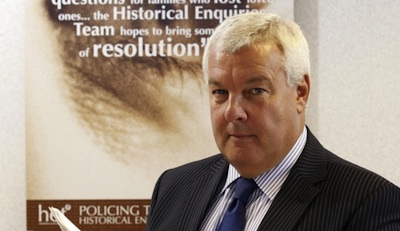
The future of the PSNI’s Historical Enquiries Team (HET) is in doubt after the Policing Board said it had no confidence in its cold case reviews.
The move came after an internal British police report found interviews by HET investigators of former British soldiers had been ‘insufficiently rigorous’.
All reviews by the HET into killings carried out by British troops have now been suspended.
The no-confidence announcement has put pressure on both PSNI Chief Matt Baggott and the HET head, former London police commander Dave Cox, to resign.
The HET was set up in 2005 to review 3,260 conflict killings between 1968 and 1998. About 1,713 cases, relating to 2,209 deaths or about two-thirds of the total, have been completed.
The unit consists of around 100 investigators and its aim was said to be to bring closure to many bereaved families who still wanted questions answered about the deaths of their loved ones.
A total of 157 killings by British soldiers between 1970 and 1973 are the main issue in the new report. Those killings were the subject of a special investigative process within the HET by a special made up of retired British police. That group has now been accused by the PSNI’s Crown bosses, ‘Her Majesty’s Inspectorate of Constabulary’, of carrying out “inconsistent” interviews of former British soldiers.
SYSTEMIC
Relatives for Justice, a group representing victims of the conflict, said the removal of Cox or Baggott would not be enough to address the fundamental and systemic problems at the heart of the HET.
“Such actions would be superficial and cosmetic as the real problem rests with the leadership and intelligence section of the PSNI that in effect created, oversaw and covered the illegal policy practice of the HET in respect of killings by the British army,” the group said.
“Such disregard for the rule of law on the part of new policing at the highest levels has clearly demonstrated to families that the PSNI cannot be allowed to reinvestigate these killings. They cannot be trusted.”
The group said an independent body similar to the police ombudsman’s office had to be created.
“Such a body should have international judicial oversight. Families demand nothing less.”
Paul O’Connor of the Pat Finucane Centre (PFC) said the report was “deeply shocking”. He said that the PFC would no longer be advising families that they had confidence in HET investigations of military cases “and we cannot in conscience suggest the families should engage”.
“Nor do we accept that the PSNI assume any role in the investigation of British army killings,” he added.
‘RELIVING EVERYTHING’
Margaret Kennedy, whose mother Maura Meehan and aunt Dorothy were killed by the British army in 1971, has called for the HET to be abolished.
She said: “I still to this day haven’t found out the truth.
“You just feel really hurt and angry.
“Every time you think you’re getting somewhere a report like that comes out you’re just reliving the whole emotional aspect of it again, you’re reliving everything.
“Emotionally and physically I can’t go through this.
“I’d no confidence in them [HET] at the start and I’ve no confidence in them now so I’m calling for them to be abolished.”
Joe Simpson, whose brother Seamus was also shot dead by the army in 1971, said his family were not informed about the investigation and were not kept up to date with the progress.
“Nobody came hear is to say there is an inquiry into your brother’s death, your son’s death,” he said.
“What can they tell us now? It’s too traumatic to go through all that again. My mother is 86.
“All we want is the truth how my brother was killed. Noting more, nothing less.”
![[Irish Republican News]](https://republican-news.org/graphics/title_gifs/rn.gif)
![[Irish Republican News]](https://republican-news.org/graphics/title_gifs/harp.gif)

